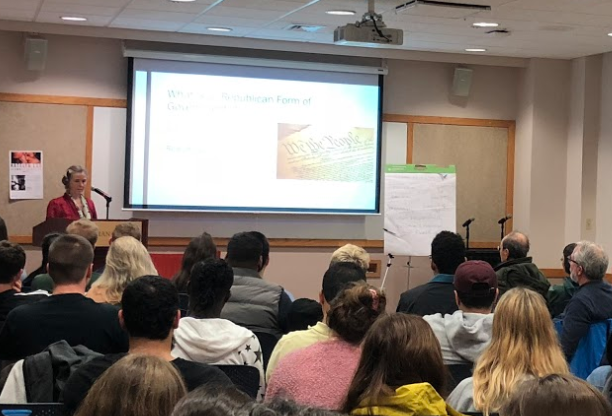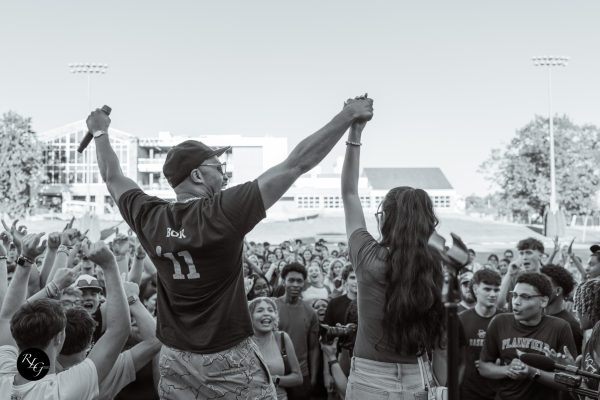German Anti-Hate Activist Armin Langer Brings His Radical Perspective to Moravian
On Thursday, Nov. 8 in the HUB UBC Room at Moravian College, Jewish German-born anti-hate activist and freelance journalist Armin Langer came to present his experiences and ideas regarding religious and racial conflict from across the Atlantic.
As Europe becomes increasingly diverse and multicultural, Langer attempts to decrease anti-immigrant sentiment, spearheading the group Salaam-Shalom (the Hebrew and Muslim words for peace) which promotes tolerance to Muslims, Jews, and other nationalities alike.
This movement stands in contrast to a wide political trend in Europe toward far-right ideologies, represented by the governments of Italy, Hungary, and Austria; a powerful component of the German parliament; and the candidacy of Marine Le Pen in the 2017 French Presidential elections.
Focusing specifically on Germany and his home of Neukölln (a borough of Berlin), Langer expounds on the methods used by the far-right to gain votes. These approaches include appealing to women, claiming that sexual assault would be more common if immigration is allowed to increase.
Another approach is to target homosexual couples and maintain that Muslims and other immigrants would not be tolerant of their lifestyle due to religious beliefs.
These methods are somewhat surprising in the political climate of the United States, as far-right candidates don’t usually support women’s rights or LGBTQ rights.
Another puzzling rhetorical strategy is the far-right’s upholding of Judeo-Christian values, targeting Muslims, says Langer. In response to this tactic, Langer comments, “Where were the Judeo-Christian values in Auschwitz?”
An additional issue is the emergence of “No-Go Areas,”certain neighborhoods that have a large immigrant population and are thus deemed unsafe for Jews. Antisemitism and Islamophobia in Germany are widespread; according to Langer, only 16 percent of Germans believe Jews should be considered German. A quarter of all Germans don’t believe Muslims can truly be German. In this respect, the U.S. is more tolerant and accepting of immigrants than Germany.
Langer proposes a theory regarding this disparity saying, “I believe that this is because of the exclusive definition of what it is to be German,” which more fundamentally includes race and religious background.
Another illustrative statistic is that one-fifth of German citizens believe that Jews have too much control over the country, although the Jewish population of Germany is minute (0.144 percent of the total German population in 2014).
A citizen of the second-most popular country in the world for immigrants, Langer aims to present a counternarrative through his organization, Salaam-Shalom. It is a loosely-organized coalition, focusing mainly on helping people from different cultures interact more with each other and feel more comfortable about their differences. A particularly enjoyable experience offered by the organization stems from a particularly frightening German word: “Zusammengehörigkeitsgefühl,” which essentially means “group cohesiveness.”
In describing this pow-wow-like activity, Langer explains, “We are quite an unprofessional group. We don’t have a set of rules. It’s up to the individual to answer the question.”
This sort of amusing group cohesiveness was put into practice when participants formed a human chain against Islamophobia and antisemitism, an event that garnered extensive media coverage and culminated in Langer’s face-to-face meeting with the German President.
His initiative has spread throughout Europe, from Copenhagen to Barcelona and Budapest. There is no centralized leadership, and each chapter is able to choose how it would like to conduct itself. Certainly, in the U.S., this relaxed approach would appear very foreign, as Americans are accustomed to mainly strong, unequivocal political activism.
In sum, Langer believes in consistent yet moderate political action in the form of enjoyment and cohesiveness, rather than the outright demanding of certain rights or changes.
As Langer closed his discussion, he provided a few bold and thought-provoking statements on truth.
A scholar of philosophy, he contended that “Everyone is right, and everyone is wrong” about the social and racial beliefs they hold. He continued, “All the narratives that contradict each other are valid.”
These striking statements, especially in our political climate, may teach us a thing or two about how people see the world across the great Atlantic.







